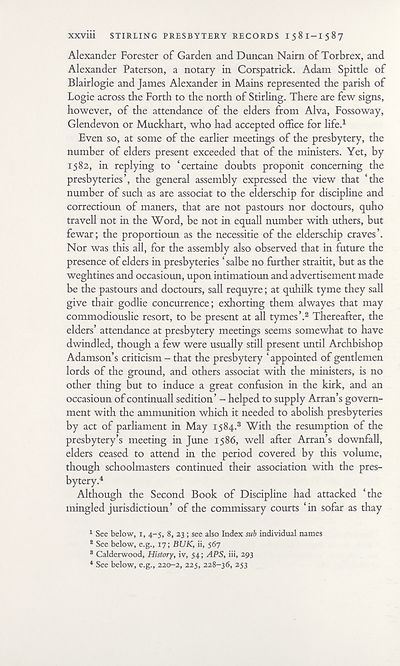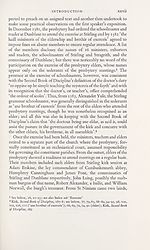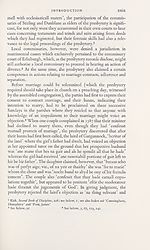Series 4 > Stirling Presbytery Records 1581-1587
(33) Page xxviii
Download files
Complete book:
Individual page:
Thumbnail gallery: Grid view | List view

XXviii STIRLING PRESBYTERY RECORDS 1581-1587
Alexander Forester of Garden and Duncan Naim of Torbrex, and
Alexander Paterson, a notary in Corspatrick. Adam Spittle of
Blairlogie and James Alexander in Mains represented the parish of
Logie across the Forth to the north of Stirling. There are few signs,
however, of the attendance of the elders from Alva, Fossoway,
Glendevon or Muckhart, who had accepted office for life.1
Even so, at some of the earlier meetings of the presbytery, the
number of elders present exceeded that of the ministers. Yet, by
1582, in replying to ‘certaine doubts proponit concerning the
presbyteries’, the general assembly expressed the view that ‘the
number of such as are associat to the elderschip for discipline and
correctioun of maners, that are not pastours nor doctours, quho
travell not in the Word, be not in equall number with uthers, but
fewar; the proportioun as the necessitie of the elderschip craves’.
Nor was this all, for the assembly also observed that in future the
presence of elders in presbyteries ‘ salbe no further straitit, but as the
weghtines and occasioun, upon intimatioun and advertisement made
be the pastours and doctours, sail requyre; at quhilk tyme they sail
give thair godlie concurrence; exhorting them alwayes that may
commodiouslie resort, to be present at all tymes’.2 Thereafter, the
elders’ attendance at presbytery meetings seems somewhat to have
dwindled, though a few were usually still present until Archbishop
Adamson’s criticism - that the presbytery ‘ appointed of gentlemen
lords of the ground, and others associat with the ministers, is no
other thing but to induce a great confusion in the kirk, and an
occasioun of continuall sedition’ - helped to supply Arran’s govern¬
ment with the ammunition which it needed to abolish presbyteries
by act of parliament in May 1584.3 With the resumption of the
presbytery’s meeting in June 1586, well after Arran’s downfall,
elders ceased to attend in the period covered by this volume,
though schoolmasters continued their association with the pres¬
bytery.4
Although the Second Book of Discipline had attacked ‘the
mingled jurisdictioun’ of the commissary courts ‘in sofar as thay
1 See below, 1, 4-5, 8, 23 ; see also Index sub individual names
2 See below, e.g., 17; BUK, ii, 567
8 Calderwood, History, iv, 54; APS, iii, 293
4 See below, e.g., 220-2, 225, 228-36, 253
Alexander Forester of Garden and Duncan Naim of Torbrex, and
Alexander Paterson, a notary in Corspatrick. Adam Spittle of
Blairlogie and James Alexander in Mains represented the parish of
Logie across the Forth to the north of Stirling. There are few signs,
however, of the attendance of the elders from Alva, Fossoway,
Glendevon or Muckhart, who had accepted office for life.1
Even so, at some of the earlier meetings of the presbytery, the
number of elders present exceeded that of the ministers. Yet, by
1582, in replying to ‘certaine doubts proponit concerning the
presbyteries’, the general assembly expressed the view that ‘the
number of such as are associat to the elderschip for discipline and
correctioun of maners, that are not pastours nor doctours, quho
travell not in the Word, be not in equall number with uthers, but
fewar; the proportioun as the necessitie of the elderschip craves’.
Nor was this all, for the assembly also observed that in future the
presence of elders in presbyteries ‘ salbe no further straitit, but as the
weghtines and occasioun, upon intimatioun and advertisement made
be the pastours and doctours, sail requyre; at quhilk tyme they sail
give thair godlie concurrence; exhorting them alwayes that may
commodiouslie resort, to be present at all tymes’.2 Thereafter, the
elders’ attendance at presbytery meetings seems somewhat to have
dwindled, though a few were usually still present until Archbishop
Adamson’s criticism - that the presbytery ‘ appointed of gentlemen
lords of the ground, and others associat with the ministers, is no
other thing but to induce a great confusion in the kirk, and an
occasioun of continuall sedition’ - helped to supply Arran’s govern¬
ment with the ammunition which it needed to abolish presbyteries
by act of parliament in May 1584.3 With the resumption of the
presbytery’s meeting in June 1586, well after Arran’s downfall,
elders ceased to attend in the period covered by this volume,
though schoolmasters continued their association with the pres¬
bytery.4
Although the Second Book of Discipline had attacked ‘the
mingled jurisdictioun’ of the commissary courts ‘in sofar as thay
1 See below, 1, 4-5, 8, 23 ; see also Index sub individual names
2 See below, e.g., 17; BUK, ii, 567
8 Calderwood, History, iv, 54; APS, iii, 293
4 See below, e.g., 220-2, 225, 228-36, 253
Set display mode to:
![]() Universal Viewer |
Universal Viewer | ![]() Mirador |
Large image | Transcription
Mirador |
Large image | Transcription
Images and transcriptions on this page, including medium image downloads, may be used under the Creative Commons Attribution 4.0 International Licence unless otherwise stated. ![]()
| Scottish History Society volumes > Series 4 > Stirling Presbytery Records 1581-1587 > (33) Page xxviii |
|---|
| Permanent URL | https://digital.nls.uk/126646551 |
|---|
| Description | Over 180 volumes, published by the Scottish History Society, containing original sources on Scotland's history and people. With a wide range of subjects, the books collectively cover all periods from the 12th to 20th centuries, and reflect changing trends in Scottish history. Sources are accompanied by scholarly interpretation, references and bibliographies. Volumes are usually published annually, and more digitised volumes will be added as they become available. |
|---|


